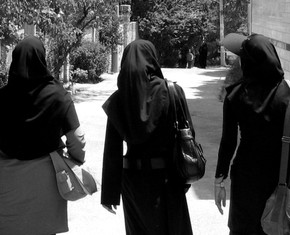The views expressed in our content reflect individual perspectives and do not represent the authoritative views of the Baha'i Faith.
Many important beliefs, practices and spiritual laws in the Baha’i Faith today, in fact, originated with the Bab, the forerunner and herald of Baha’u’llah.
The uniqueness of the Baha’i Faith – with its co-founders the Bab and Baha’u’llah, the twin prophets who appeared in such close proximity to each other – means that we can justifiably speak of the “living legacy” of the Bab.
The Bab’s most important mission, of course, was to announce the coming of Baha’u’llah. As stated in the previous article in this series, both the Bab and Baha’u’llah co-founded the Baha’i Faith. This is not only for historical reasons (in that the Bab announced the imminent advent of Baha’u’llah) but for contemporary reasons as well. Take, for example, the Bab’s influence on Baha’i devotions.
The heart of devotional life in the Baha’i community is the 19-Day Feast, when Baha’is in every community gather to pray, consult and socialize. In Baha’u’llah’s Most Holy Book, the Baha’i repository of religious laws, Baha’u’llah ordained the Feast as a devotional practice:
Verily, it is enjoined upon you to offer a feast, once in every month, though only water be served; for God hath purposed to bind hearts together, albeit through both earthly and heavenly means. – p. 40.
“The 19-Day Feast is an institution of the Cause,” according to Shoghi Effendi, and was “first established by the Bab, later confirmed by Baha’u’llah, and now made a prominent part of the administrative order of the Faith.” – The Light of Divine Guidance, Volume. 1, p. 212.
“In the Arabic Bayan the Bab called upon His followers to gather together once every nineteen days to show hospitality and fellowship,” the Universal House of Justice wrote, “Baha’u’llah here [in the Most Holy Book] confirms this and notes the unifying role of such occasions.” – The Most Holy Book, p. 202. Abdu’l-Baha further explained the importance of this essential community activity at the heart of Baha’i devotional life:
This Feast was established by His Highness the Bab, to occur once in nineteen days. Likewise, [Baha’u’llah] hath commanded, encourage and reiterated it. Therefore, it hath the utmost importance. Undoubtedly you must give the greatest attention to its establishment and raise it to the highest point of importance, so that it may become continual and constant. The believers of God must assemble and associate with each other in the utmost love, joy and fragrance. They must conduct themselves (in these Feasts) with the greatest dignity and consideration, chant divine verses, peruse instructive articles, read the Tablets of Abdul-Baha, encourage and inspire each other with love for the whole human race, invoke God with perfect joy and fragrance, sing the verses, glorifications and praises of the Self-subsistent Lord and deliver eloquent speeches. The owner of the house must personally serve the beloved ones. He must seek after the comfort of all and with the utmost humility he must show forth kindness to every one. If the Feast is arranged in this manner and in the way mentioned, that supper is the “Lord’s supper,” for the result is the same result and the effect is the same effect. – Abdu’l-Baha, Tablets of Abdul-Baha, Volume 2, pp. 468–469.
Although the Bab inaugurated and instituted the 19-Day Feast, this spiritual and divine institution evolved over time. Today, a Baha’i Feast is comprised of devotional, consultative and social functions in what now has become a three-part program. The consultative portion of Feast functions as the Baha’i counterpart of a “town meeting,” in which the Baha’is consult on the affairs of the local community, and make suggestions and recommendations to the local Baha’i council, known as the Local Spiritual Assembly. At its discretion, the Assembly may report back at the next Feast in order to inform the local Baha’i community of its response to any given Feast recommendation.
The current Baha’i practice of hosting “devotional meetings” in neighborhoods across the world may be seen as an extension of the prayerful character of the 19-Day Feast. Devotional meetings, which can be held any time and any place, allows the participants to experience that devotional character. As such, the Bab’s “living legacy” has become even more extensive, immediate and vibrant throughout the global Baha’i community.
Like some other religions, Baha’is use prayer books. Included among these prayers are those revealed by the Bab. The American edition of Baha’i Prayers, for example, has 39 such prayers selected and included, out of a total of 185 prayers in the entire book. Those 39 prayers revealed by the Bab account for 21 percent, which means that over one-fifth of the Baha’i prayers most often prayed by Baha’is come from the Bab, whose “living legacy” continues every day. Here is one example of an inspiring and empowering prayer by the Bab:
Ordain for me, O my Lord, and for those who believe in Thee that which is deemed best for us in Thine estimation, as set forth in the Mother Book, for within the grasp of Thy hand Thou holdest the determined measures of all things.
Thy goodly gifts are unceasingly showered upon such as cherish Thy love, and the wondrous tokens of Thy heavenly bounties are amply bestowed on those who recognize Thy divine Unity. We commit unto Thy care whatsoever Thou hast destined for us, and implore Thee to grant us all the good that Thy knowledge embraceth.
Protect me, O my Lord, from every evil that Thine omniscience perceiveth, inasmuch as there is no power nor strength but in Thee, no triumph is forthcoming save from Thy presence, and it is Thine alone to command. Whatever God hath willed hath been, and that which He hath not willed shall not be.
There is no power nor strength except in God, the Most Exalted, the Most Mighty. – The Bab, Baha’i Prayers, pp. 130–131.
So there you have it! The Bab was far more than the Herald, or announcer, of the imminent advent of Baha’u’llah. The Bab revealed a vast array of teachings, doctrines, prayers, religious laws and devotional practices. After he fulfilled the prophecies of the Bab, Baha’u’llah actually adopted a number of religious laws originated by the Bab. Of course, Baha’u’llah did so selectively, and after adopting a given law, would adapt it according to the needs of this day and age.
The Bab’s profound teachings, his beautiful prayers, and his powerful spiritual laws, as adopted and adapted by Baha’u’llah and as practiced by Baha’is worldwide, constitute the precious heritage bequeathed by the Bab. That heritage, very much part and parcel of Baha’i life and experience today, provides a contemporary testament to the Bab’s living legacy.
















Comments
Sign in or create an account
Continue with Googleor